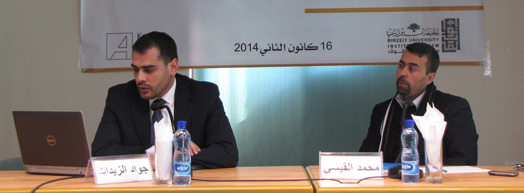Jordan's Experience in Developing an e-Government Portal
The event brought together members of the lawyers’ community, representatives of government bodies, and students of the Faculty of Law and Public Administration.
In his opening remarks, Dr. Mohammed al Qaysi, Professor of Commercial Law at Birzeit University, welcomed the speaker and audience. Stressing its significance, Dr. Qaysi explained that the IoL-sponsored Legal Encounters Programme introduces emerging legal issues.
Advocate Jawad Zyadat, made a briefing note about e-government operations. In Jordan, the 2001 Electronic Transactions Law of 2001 provides a legal umbrella for e-transactions. As a previous legal framework did not govern this activity, the Law is designed to ensure stability of e-transactions.
To be valid and produce a legal effect, e-records and e-signatures should satisfy certain terms and conditions. In relation to scope of enforcement, the E-transactions Law covers government-issued financial legislation. However, the Law is impaired by several legal gaps. The e-payment process involves three parties: the public, government, and e-payment service providers. In this context, Advocate Zyadat explained the legal status of the relationship between all three parties.
Finally, Mr. Zyadat stated that all e-payment methods were put to operation in Jordan. E-payment is impeded by legal problems, which negatively impact stability of e-transactions.
In the ensuing discussion, the audience discussed areas in which e-payment could be used, agencies responsible for e-payment gateway management, and public awareness of e-payment. Participants also emphasised significance and risks of e-government as well as guarantees and procedures to reduce these risks.
The legal encounter was organised in partnership with the Konrad Adenauer Stiftung - Ramallah Office.











